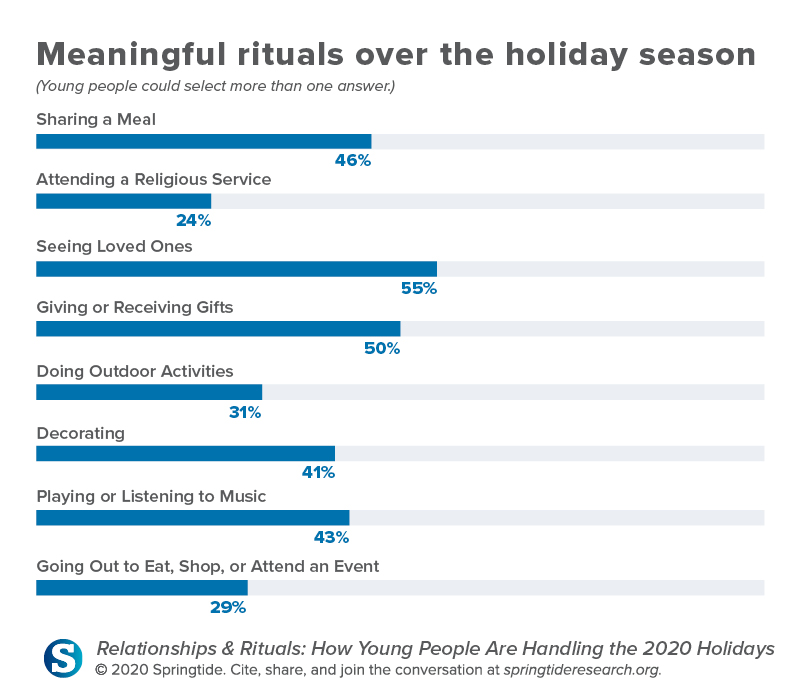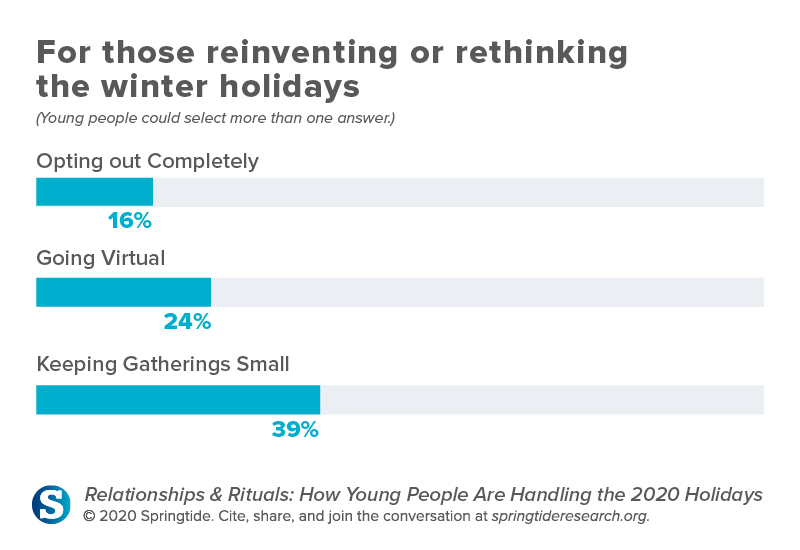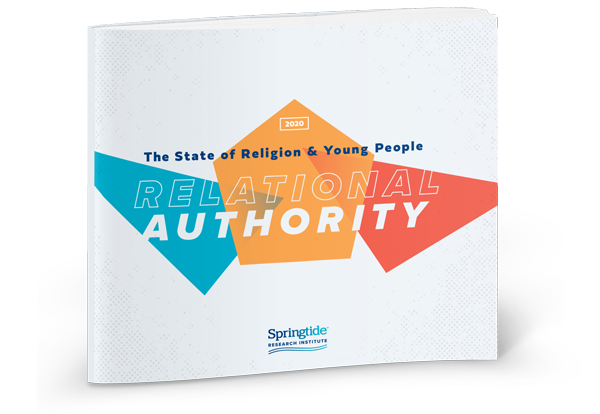
Relationships & Rituals: How Young People Are Handling the 2020 Holidays
For many young people throughout the United States, the concluding months of every calendar year mark a time of celebration. Religious and secular holidays alike dot these final months: Diwali, Mawlid, Thanksgiving, the anniversary of Guru Nanak’s birth (founder of Sikhism), Hanukkah, Kwanzaa, Advent, Winter Solstice, HumanLight, Christmas, and New Year’s Eve. Eighty-seven percent of young people ages 13–25 tell us they celebrate some kind of winter holiday.
But at the close of this year, states around the country have increased restrictions around gatherings and travel as COVID-19 continues to be a serious threat.
So what might the holidays look and feel like in 2020? Springtide Research Institute asked over 2,000 young people, ages 13–25, what they are planning and how they are feeling about this winter holiday season.
![]()
At the heart of many holiday traditions are two things: ritual and relationship. And our way of expressing these two things has changed as mandates around social distancing have disrupted normal community events and the rituals inherent to those gatherings.
Unsurprisingly, when we asked about the rituals that matter to young people, the majority (55%) told us that seeing loved ones was the most meaningful.

Fifty-six percent of young people told us they feel safe, welcome, and encouraged to have vulnerable conversations about difficult issues during the holidays, but 62% don’t talk to the people they spend the holidays with about difficult things because they want it to be a time of joy and lightheartedness. This means that even with bonds of trust, transparency, and listening that make difficult conversations possible, many young people hope for other conversations when it comes to holiday celebrations.
![]()
We know that 87% of young people ages 13–25 celebrate winter holidays. When we asked whether COVID-19 is causing changes in their typical holiday plans, some reported feeling sad (23%) or relieved (18%), and others didn’t care (22%) about those shifts.
But 38% told us they are excited about rethinking the holidays this year in light of COVID-19, and only 25% said they also felt stressed about having to rethink their regular plans. (Young people could select more than one answer.)

![]()
Take Action: 3 Tide Turning Tips for helping young people navigate the holidays
![]() Support the young people in your life who might feel overwhelmed, sad, or stressed about how to rethink the holidays during a pandemic, or who aren’t necessarily interested in rehashing the difficulties of the year (whether in person or in a video call). Ask them how they’re feeling and make room in your celebrations for anyone who might be feeling tired, beatdown, or overwhelmed this year.
Support the young people in your life who might feel overwhelmed, sad, or stressed about how to rethink the holidays during a pandemic, or who aren’t necessarily interested in rehashing the difficulties of the year (whether in person or in a video call). Ask them how they’re feeling and make room in your celebrations for anyone who might be feeling tired, beatdown, or overwhelmed this year.
![]() Most young people tell us that seeing loved ones is the most meaningful ritual of the holiday season to them. If your holidays will look a little different this year, write a letter, make a video, or send a care package full of memories and well-wishes.
Most young people tell us that seeing loved ones is the most meaningful ritual of the holiday season to them. If your holidays will look a little different this year, write a letter, make a video, or send a care package full of memories and well-wishes.
![]() Find out what ritual the young people in your life most value this holiday season, and work with them to creatively reinterpret it to suit this season. Schedule a binge-watching session of holiday movies over Zoom; send a recipe and co-cook a favorite dish, at a distance; invite their friends, roommates, coworkers, or anyone else in their social bubble into the celebration by sharing more about the background of a certain religious ritual or celebration.
Find out what ritual the young people in your life most value this holiday season, and work with them to creatively reinterpret it to suit this season. Schedule a binge-watching session of holiday movies over Zoom; send a recipe and co-cook a favorite dish, at a distance; invite their friends, roommates, coworkers, or anyone else in their social bubble into the celebration by sharing more about the background of a certain religious ritual or celebration.
Find more Tide-Turning Tips that can shape your work with young people in our most recent research report, The State of Religion & Young People 2020: Relational Authority.




